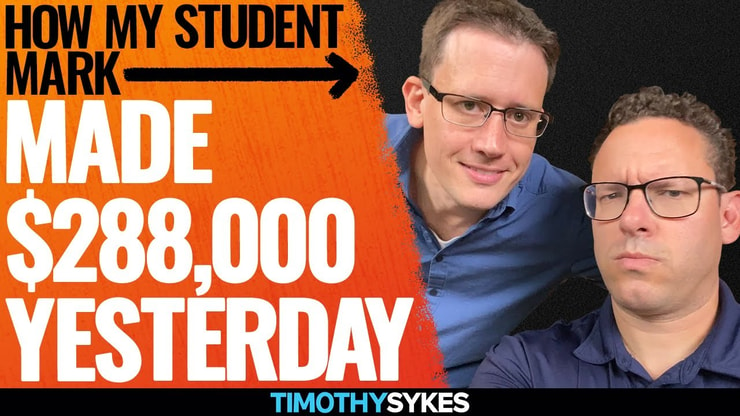The right way to learn options trading involves studying strategies and getting lots of screen time…
The options trading learning curve is steeper than penny stock trading. This just means you have to work harder!
There are no shortcuts in trading… But you can learn from the mistakes of others without making your own.
Read on for the best courses for learning options trading!
Table of Contents
What Is Options Trading?

Options trading is trading in financial instruments that give you the right to buy or sell the asset they’re attached to.
Options contracts are derivatives, so they don’t have value in themselves. They represent the right to trade assets at a certain price in a certain time period. This agreed-upon price is called the “strike price.”
Options aren’t just for the stock market — there are options for mutual funds, commodities, and more.
In the options market, you have two parties: the holder/buyer and the writer/seller. As a buyer, you pay the seller for an option on their assets. The money you pay the seller is called a “premium.”
Options contracts give you a right and not an obligation to exercise them. If you let your contract expire, you’ll only lose the premium.
Check out this article to learn more about the basics of options trading.
Why Is Trading Options a Valuable Skill?
Trading options is a valuable skill the same way every trading strategy can be valuable in the right hands. Take my former student Mark Croock — he’s made $3.9 million in career earnings mostly through trading options.
They suit his trading style because of the following qualities:
- Options are flexible: You don’t have to buy or sell the asset written in your options contract. You can let a contract expire, trade it, or pull off a more complicated maneuver.
- Options provide leverage: Options require a relatively small premium for the size of market exposure they provide.
- Options are a good way to trade higher-priced stocks: I like penny stocks because of their volatility. If you prefer higher-priced stocks which move less randomly, options are a good way of profiting off their smaller price moves.
Check out this guide on how options trading works to learn more.
Basic Requirements for Learning to Trade Options

What do you need to learn about options trading as a beginner? You’ll need these four things:
An Options Trading Account
Many brokers provide access to the options market. Choose the one that best fits your trading style.
Most brokers have certain requirements that you need to fit before they’ll let you trade options. They’ll probably ask you questions about your experience and financial situation.
Here’s a guide to trading options on one broker — Robinhood.
A Trading Plan
A good trading plan determines your goals and risk. Always stick to this plan to ensure that you’re trading with your head, not your emotions.
A plan will also help you finetune your strategy. Record your trades so you have a clear picture of what’s working for you and what isn’t.
More Breaking News
- Guardant Health: Unraveling the Surprisingly Flourishing Revenue Trajectory
- Rivian’s Surge: Delivery Triumphs Spark Investor Interest
- Why Helius Medical Technologies’ Stock Flew Up 24%! Exploring the Latest Surge
A Supportive Community
One of the best ways to grow as a trader is by learning from more experienced traders. A good options trading community will help you find and connect with these traders.
Educational resources will help you learn the basics, but feedback from experienced options traders can improve your options strategies. Don’t be afraid to ask for suggestions and pointers on how to improve your trading plans.
Experts to Learn From
Any trading community worth its salt will be led by an experienced mentor. I’m not talking about a trading “guru” here — I’m talking about a trader who’s figured out their trading edge so well that they can teach you how to find your own.
That’s what this next section is about…
Best Courses to Learn Options Trading

My top options trading course picks are:
- Evolved Trader
- Investopedia’s Options for Beginners
- Udemy’s Options Trading Basics
- Benzinga Options School
There is no one-size-fits-all in trading. This is even more true for options trading.
These courses cover the full range of options education needs, starting with my top pick…
Course 1: Evolved Trader
My first options trading course pick is Evolved Trader.
I’ve already told you why Evolved Trader’s lead trainer, Mark Croock, has my trust. He has a proven track record — he’s made $3.9 million in profits mostly through trading options. I’ve taught with him, worked with him in my Trading Challenge, and learned from him.
Here’s what you will get in his Evolved Trader course:
- Free weekly webinars and a back catalog of videos lessons
- Two alert services tailored to different options strategies
- Discord chat room
- Options Bootcamp Course — this course gives you all the foundation the next two picks offer
- Mark even pulls out his accounting experience for a tax strategy session!
Why We Like It
I can vouch for Mark more deeply than almost any trader in the world.
Not only can he do this…
Give MAJOR props to @thehonestcroock who now locked in $284,000 in trading profits today on his $BITO $SPY puts, huge congratulations to all his https://t.co/a3dSVG2iCc students too, it pays to learn from transparent millionaire traders, not those too cowardly to show ALL trades! pic.twitter.com/Y3blFky3hw
— Timothy Sykes (@timothysykes) June 13, 2022
He can explain it, too:
Mark’s Evolved Trader course manages to simplify options trading, instead of pulling you into a labyrinth of Greek symbols like most other options courses.
He stays focused on the big picture. And he keeps his trades — and his students — safer than nearly any other trader I know.
Sign up for Evolved Trader here!
Course 2: Investopedia’s Options for Beginners
My second options trading course pick is Investopedia’s Options for Beginners.
This course is designed to give traders a thorough foundation in options trading. It’s taught by options trader Lucas Downey, a former Wall Street trader who co-founded MAPsignals. MAPsignals is a unique platform that tracks institutional investment in the market.
The course covers all of the basics:
- Understanding options
- Puts and calls
- Risk management
- Technical analysis
- Trade examples
Why We Like It
Think of this as an options textbook. It doesn’t get too heavy into strategy, and there is no individual consultation. But if you want a fast-start options course, this is a decent choice.
Check out Investopedia’s course here.
Course 3: Udemy’s Options Trading Basics
My third options trading course pick is Udemy’s Options Trading Basics.
The course is taught by Hari Swaminathan, founder of OptionTiger, which offers its own respected options curriculum. OptionTiger’s beginners’ course is almost 3 times as expensive as the Udemy course, giving budget-conscious traders a good point of reference.
This Udemy course covers the following:
- Call and put options
- Time, volatility, and Greeks
- Options trading strategies
- Live trades
- Stock and options combo strategies
- Adjusted options
Why We Like It
This course delivers a ton of content. It’s over 11 hours of video tutorials for under $100. You can find it on sale even cheaper.
If you’re curious about OptionTiger, this course is a great opportunity to test drive Swaminathan’s approach.
Check out Udemy’s course here.
Course 4: Benzinga Options School
My fourth options trading course pick is Benzinga Options School.
Course instructor Chris Capre is the founder of 2nd Skies Trading, a platform which has its own slate of trading courses. He’s a former hedge fund guy who has a solid profile.
Why We Like It
If you’re looking for a comprehensive alternative, Benzinga Options School hits most of the prerequisites. It gives traders access to:
- Live webinars and a video lesson back catalog
- Member chat room
- Q-and-A with a trading mentor
Benzinga Options School also offers access to Benzinga Pro, a news-first trading platform.
Sign up to Benzinga’s course here.



Leave a reply